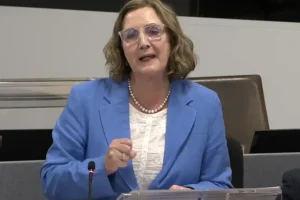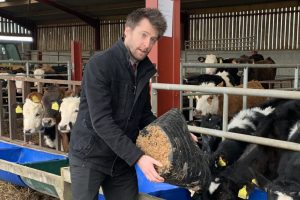DEFRA Secretary Michael Gove used a keynote speech to the Oxford Farming Conference to say that if UK agriculture does not embrace change we will be left behind, and Brexit offers the opportunity to shape that change and how we meet the challenges ahead.
SUBSIDIES CONTINUE TO 2024
Mr Gove guaranteed farmers the same level of subsidy until 2024, but said that CAP was created for a post-war world which is no longer relevant.
He said: “Paying land owners for the amount of agricultural land they have is unjust, inefficient and drives perverse outcomes. Indeed, perversely, it rewards farmers for sticking to methods of production that are resource-inefficient.”
In his paper, Farming for the Next Generation, as well as moving away from subsidies, Mr Gove’s proposals for future agricultural policy are based on incentivising innovation and giving the farmers the tools they need to progress, maintaining the UK’s reputation for quality food and high welfare, and building on natural capital to sustain the countryside for the future. He is also aware of the Government’s responsibility to public health.

Mr Gove told his audience: “I want to ensure we develop a coherent policy on food – integrating the needs of agriculture businesses, other enterprises, consumers, public health and the environment.
“I want to develop a new method of providing financial support for farmers which moves away from subsidies for inefficiency to public money for public goods.
“I want to give farmers and land managers time and the tools to adapt to the future, so we avoid a precipitate cliff edge but also prepare properly for the changes which are coming.
“And I want to ensure that we build natural capital thinking into our approach towards land use and management so we develop a truly sustainable future for our countryside.”
Addressing both the pace of demographic change and the challenges posed by Brexit, Mr Gove said: “We can’t stop change coming, we simply leave ourselves less equipped to deal with the change. There is a tremendous opportunity for productivity in our farms. We have some of the best performing farms in the world and there is no reason why our farmers cannot lead the way in achieving better levels of productivity throughout adoption of best practice and new technologies.”
Touching on the vexed issue of migrant labour’s importance to farming, Mr Gove suggested that seasonal labour would still be easily available and looked to a future where labour-intensive farming was replaced by as yet undefined new technology.
The government now proposes to keep similar payments to the BPS available until 2024. The current EU payments may well end at the end of 2020 to tie in with the EU budget, and Mr Gove suggested that area-based support payments would be phased out over a longer period after that, but “we won’t perpetuate that forever”.
‘PERVERSE’ SUBSIDY SYSTEM BENEFITS THE WEALTHY
Responding to Michael Gove’s speech, Professor Ian Bateman, Director of the Land, Environment, Economics and Policy Institute (LEEP), at the University of Exeter, said: “Michael Gove’s reaffirmation that the public money supporting farm subsidies should be spent on delivering public goods is to be welcomed; if this is carried through then he will deserve to be congratulated on breaking more than four decades of failure in agricultural policy. But it is disappointing to see that the system of paying most subsidies on a per acre basis is going to carry on for several years.
“At present 75% of public subsidies go to just 25% of farms; the largest farms in the country. This rewards multi-millionaire estate owners while other farmers remain in poverty. I have no problem with large farms getting payments if they produce high levels of public goods; but to get these payments just because they are large is perverse. It’s good to hear that this scheme may be capped, but it needs to end.”
INCENTIVES SHOULD TARGET ANIMAL WELFARE
RSPCA head of public affairs David Bowles said: “Paying farmers to achieve high animal welfare standards is a no-brainer. Farm subsidies targeted at animal welfare will be good for new trade deals, good for consumers and good for the animals.
“If post-Brexit farm support schemes include ring-fenced incentives for farmers to improve animal welfare, the government’s laudable ambitions for the UK to produce the highest quality food will be met. This, coupled with Environment Secretary Michael Gove’s newly announced comprehensive food labelling system which includes, amongst other things, indicators on animal welfare standards, would be the icing on the cake.
“As the UK leaves the EU and nationalises the farming support system this presents us with a once-in-a-generation chance to radically transform the Common Agricultural Policy (CAP) into a British policy for humane animal and sustainable land management.
“If we get it right now, the UK’s food quality can become the world’s gold standard – and that can only happen with the highest possible animal welfare.”
The RSPCA also welcomed Environment Secretary Michael Gove’s commitment to a much more comprehensive food labelling system that measures how a farmer or food producer performs against a number of indicators, including animal welfare.
ENVIRONMENTAL INCENTIVES WELCOMED
Helen Browning, CEO of the Soil Association said: “We warmly welcome the move towards an agricultural policy that prioritises environmental protection and the new emphasis on the vital links between food, farming and public health. The clear timetable provides much-needed certainty for farmers, whilst the commitments on public procurement and better labelling are important for food producers and consumers alike. We now need to see more detail on how farmers will be enabled and encouraged to shift to higher animal welfare systems, move away from synthetic pesticides, restore degraded soils and improve water quality.
“We don’t see these proposals as leading to a reduction in UK food production – but rather about a fundamental shift in how we produce food so that farming systems are truly sustainable. In many areas, we want to see more domestic production to meet demand, especially fruit and vegetables and organic.
“The greatest test of this transition is whether the UK’s food and farming system measures up to the monumental challenges of public health, which was highlighted in the speech, and climate change, which received just two mentions. The Government must also make an ambitious and unambiguous commitment to organic and other agro-ecological approaches which are proven to deliver on animal welfare, biodiversity, soil health and climate change – both during the transition and after 2024.”
CAP BAD FOR THE COUNTRYSIDE
Countryside Alliance Chief Executive Tim Bonner said: “Michael Gove’s speech confirmed the direction of travel for British agricultural policy post-Brexit.
“The move away from area based payments to rewards for delivering environmental and public goods is far from the revolution some have hailed, but it will be significantly accelerated by a departure from the Common Agricultural Policy.”
Mr Bonner continued: “Interestingly, just about the only thing that all sides of the Brexit argument, from the Liberal Democrats to Farming minister and Brexiteer George Eustice, seem to agree on is that CAP has been bad for the countryside, consumers and farmers. Attempts to reform the CAP have been achingly slow as the EU convoy moves only at the speed of the slowest. Brexit creates an opportunity for the UK to create our own farming policy for the first time in more than 40 years and move ahead of the pack.”
However, Tim Bonner sounded a cautionary note: “That is the good news, but there are also valid reasons for concern. There remains an inherent contradiction between agricultural productivity and protecting the environment which has not yet been addressed in detail by the Government and which goes to the heart of the big long-term question: how much will the public be willing to continue to pay for the countryside that farmers maintain?
“Under the CAP the question of farm support has been decided in Brussels and the combined weight of the European farming lobby has had a significant influence. Post Brexit levels of farm support will become a direct domestic political issue for the first time for a generation. The farm support budget will have to compete with the NHS, Defence, Education and all other areas of Government expenditure in future spending rounds. In order to maintain levels of support farmers will have to persuade the public, and through them politicians of all parties, that the public goods they provide continues to justify the money they receive from the taxpayer. This will be the greatest challenge for UK farming outside the EU.”
‘A TRIUMPH OF HOPE OVER PRACTICALITY’
TFA Chief Executive George Dunn said “We are used to having our hopes dashed of hearing a meaty Oxford Farming Conference speech from incumbents as DEFRA Secretaries of State but not this time. Like or loathe what we heard, we received a fairly firm view of future Government policy, the like of which we have not seen since Hillary Benn’s speech in 2010 in which he set out his 20 year plan to boost domestic food production. That plan fell by the wayside when Labour lost the 2010 General Election later that year and we will have to wait to see if the Gove plan survives the political choppy waters of our time.
“Disappointingly, there was a triumph of hope over practicality in the extent to which Mr Gove seems to be relying upon technological change to provide the swift answers we need to address labour shortages and the urgent need to increase farm productivity. Also on the negative side, there was nothing said specifically about the tenanted sector of agriculture, and there also continues to be too much reliance on the market being the means by which we sort out our food safety and food standards issues in a free trading environment.” said Mr Dunn.
“On the plus side there was a clear understanding of the need for a sufficient period of transition to a new policy framework. A commitment for the Government to act as a strong champion of British produce at home and abroad. A pledge to deal with market failure in the food chain and a promise that no one entering into an agri-environment scheme today will be disadvantaged when new schemes are developed for the post Brexit era,” Mr Dunn concluded.
FUW WANTS ‘MEAT ON BONES’
The Farmers’ Union of Wales described the as welcome, but says Welsh farmers remain in the dark over many important issues.
FUW President Glyn Roberts said: “We very much welcome Mr Gove’s apparent commitment to agricultural funding until 2024, and the general thrust of his speech, which described a prosperous and forward looking post-Brexit industry which is rewarded for delivering the very best in terms of food, the environment and social contributions to society.
“However, the nuts and bolts of turning such a vision into reality are where the obstacles will lie, and we look forward to seeing more meat on the bones in the long-awaited DEFRA white paper, due in the spring.”
Mr Roberts said many Welsh farmers would also be concerned that nothing was said about progress on talks between devolved regions on how devolved powers and funding might operate once we leave the legal framework of the Common Agricultural Policy (CAP).
“Wales currently has devolved powers over agricultural and rural development spending and policy, but this is within the limits laid down in the CAP framework.
“The FUW fully supports such devolved powers continuing. But, we now need to ensure that devolved powers are fully respected by all 4 nations and that we don’t see the creation of support mechanisms that benefit one nation over another. Therefore we need to develop a UK framework which ensures equivalence between producers in the four nations, which respects devolved powers and allows a degree of flexibility.”
While acknowledging that this was a difficult balance to strike, especially given political differences between devolved regions, Mr Roberts said progress was necessary.
“We currently have such a system, so it is not difficult to see how a framework could be developed which strikes a sensible balance between respecting devolved powers and avoiding the dangers of a free-for-all.”
Mr Roberts said reaching sensible agreement on spending frameworks should be a priority, in order to avoid inappropriate and unfair divergence between spending areas in devolved nations.
He also emphasised the need for Mr Gove’s vision for the future of UK agriculture to be underpinned by an acceptable post-Brexit trade deal with the EU.
“I therefore welcome his fellow speaker’s, Professor De Castro’s, confirmation of the EU’s desire to ensure tariff-free trade between the UK and EU post-Brexit,” he added.
Mr Roberts also welcomed USA Under-Secretary McKinney’s comments regarding the desire to increase agricultural trade between the UK and US, but warned that care needed to be taken to ensure any new arrangements did not compromise existing markets.
“Standards in the US are very different to those in established UK and EU markets, and we need to ensure new arrangements do not compromise or undermine established markets.”














Add Comment